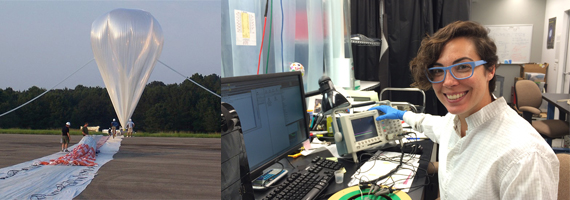
Dr. Erika Hamden to Join Astronomy/Steward in Fall 2018
Dr. Erika Hamden will join the University of Arizona Department of Astronomy and Steward Observatory in the fall of 2018. Her research focuses on UV instrumentation, detector technology development, multi-object & IFU spectroscopy, and galaxy evolution. Dr. Hamden is the project scientist for the Faint Intergalactic-medium Redshifted Emission Balloon (FIREBall), a UV multi-object spectrograph designed to observe the circum-galactic medium (CGM) in emission at UV wavelengths, scheduled for flight in September 2018. Dr. Hamden is also the project scientist for the Keck Cosmic Reionization Mapper, the red channel of the Keck Cosmic Web Imager, a high resolution IFU on Keck 2. Dr. Hamden is interested in large scale galactic outflows and inflows, with on-going work focused on observing emission from Lyman-alpha and MgII from the CGM of galaxies using integral field units at a range of redshifts. Dr. Hamden is working on the development and testing of UV optimized Electron Multiplying CCDs with the Advanced Detectors, Systems and Nanoscience Group (389E) Group at JPL. She also has a larger interest in silicon detector technologies.
Dr. Hamden received a bachelors in Astronomy and Astrophysics from Harvard in 2006. She worked as a chef for a year before beginning grad school at Columbia University. She worked with Prof. David Schiminovich, finishing her PhD in 2014. She moved to Caltech for a postdoc, working with Prof. Chris Martin and was an NSF Astronomy and Astrophysics Postdoctoral Fellow and the R.A. and G.B. Millikan Prize Postdoctoral Fellow in Experimental Physics at the California Institute of Technology. Dr. Hamden was awarded a Nancy Grace Roman Technology Fellowship for her detector work in 2016.

For Public
Public events include our Monday Night Lecture Series, world-reknowned Astronomy Camp and Mt Lemmon Sky Center.

For Students
A good place to start if you want to become an undergrad major or grad student, or need to find our schedule of classes.

For Scientists
Find telescopes and instruments, telescope time applications, staff and mountain contacts, and faculty and staff scientific interests.




